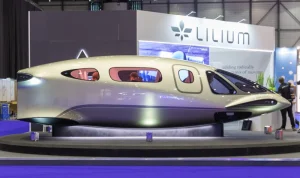Imagine a world in which flying vehicles transport us into the skies, avoiding traffic and reducing our carbon footprint. This is the promise of fully electric flying cars. In this post we will explore the current state of electric flying cars and their potential to revolutionize urban transportation.

Fully electric flying cars, also known as electric vertical take-off and landing aircraft (eVTOLs), have captured our imagination for decades. With recent advances in technology and a growing focus on sustainability, the idea of electric flying cars is no longer confined to science fiction. These innovative vehicles have the potential to transform the way we get around and navigate our cities.
Environmental benefits
One of the most significant benefits of all-electric flying cars is their potential environmental impact. By replacing traditional fossil-fueled vehicles with electric ones, we can significantly reduce carbon emissions and air pollution. The use of electric propulsion systems eliminates direct emissions, making these vehicles a cleaner and more environmentally friendly alternative to traditional modes of transportation.
Changing urban transportation
Imagine flying over traffic congestion and reaching your destination in a fraction of the time it would take on the road. Electric flying cars have the potential to ease the burden of traffic, offering faster and more efficient travel options. They could open up new transportation networks, connecting previously unreachable areas and reducing pressure on existing infrastructure.
Technology and infrastructure
Advances in battery technology are a key factor for electric cars. The development of high energy density batteries allows for longer flight times and greater efficiency. However, widespread adoption of electric flying cars would require a robust charging infrastructure to support these vehicles. In addition, air traffic management systems would need to be developed to ensure safe and efficient operations in urban airspace.
Fully electric flying cars: Challenges and solutions
Although the concept of flying cars is exciting, there are challenges that need to be addressed for their successful integration in our cities. Safety issues and regulations are of paramount importance to ensure public confidence in these new modes of transportation. Noise pollution is another consideration, as noise levels from flying cars could impact communities.
Public acceptance and education will play a key role in addressing these concerns and fostering a positive reception. One project already underway that addresses this is VoloIQ, a software program capable of managing all aspects of eVTOL mobility in urban areas.
Case studies and companies
Several eVTOL manufacturing companies are at the forefront of the development of flying cars. Lilium, with its vertical takeoff and landing technology, aims to create air cabs for urban mobility. Joby Aviation focuses on developing silent electric air cabs that can take off and land vertically. Uber Elevate is building an urban air mobility platform to enable aerial ridesharing, while Volocopter is pioneering electric eVTOL aircraft for urban transportation.
Future of electric flying Cars
The future of urban transportation looks exciting with the advent of electric flying cars. These innovative vehicles have the potential to ease traffic congestion, reduce carbon emissions, and transform the way we navigate our cities. Although there are challenges to overcome, the progress made by companies such as Lilium, Joby Aviation, Uber Elevate, and Volocopter demonstrate the tangible reality of such cars. As we continue to invest in technology and infrastructure, we are one step closer to realizing a future where the skies will be filled with clean and efficient electric vehicles, revolutionizing urban transportation as we know it.
Links:

